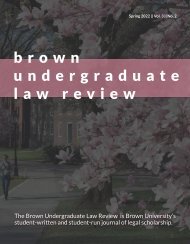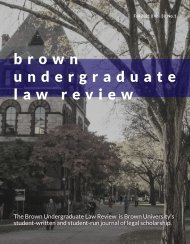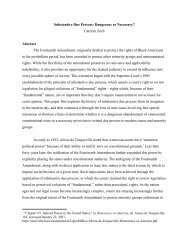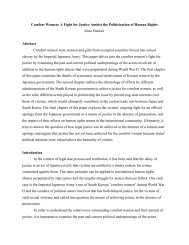Brown Undergraduate Law Review — Vol. 2 No. 2 (Spring 2021)
We are proud to present the Spring 2021 issue of the Brown Undergraduate Law Review. We hope that the works contained herein offer insight and inspiration to all who read them.
We are proud to present the Spring 2021 issue of the Brown Undergraduate Law Review. We hope that the works contained herein offer insight and inspiration to all who read them.
You also want an ePaper? Increase the reach of your titles
YUMPU automatically turns print PDFs into web optimized ePapers that Google loves.
Targeting Muslims and Civil Liberties Prevention:<br />
An Analysis of the Countering Violent Extremism Program?s First Amendment Violations<br />
and advocacy in the realm of ideas.? 39 Therefore, in order hate crime or terrorist attack.? 41 These conspiracy statutes<br />
for CVE to be constitutional, it would need to prove that it have been used previously by the Justice Department in<br />
was targeting individuals and groups that present a ?clear hate crime and domestic terrorism cases. Relevant<br />
and present danger,? and only those targets? the program conspiracy statutes include those that deem illegal a<br />
must be narrowly tailored.<br />
?conspiracy to injure, threaten, or intimidate a person in<br />
free exercise or enjoyment of any right or privilege secured<br />
CVE has failed to demonstrate that it specifically targets<br />
under the Constitution or U.S. laws? and ?conspiracy to<br />
only individuals who present a ?clear and present danger.?<br />
defraud the United States.?<br />
CVE?s primary intent is to ?[prevent] violent extremists<br />
42 These statutes operate in line<br />
with previous Supreme Court precedents, which delineate<br />
and their supporters from inspiring, radicalizing, financing<br />
the necessity of a ?clear and present danger? or an<br />
or recruiting individuals or groups in the United States to<br />
commit acts of violence.? 40 ?imminent threat of violence? before restricting First<br />
In furtherance of this aim,<br />
Amendment rights of free speech, expression, and exercise<br />
CVE has targeted individuals with no criminal history,<br />
of religion. Given that such statutes exist and have proven<br />
based upon deeply flawed markers of extremism like their<br />
successful in the prevention of terrorism and<br />
community, religious, and school affiliations. The Court<br />
extremism? without targeting an entire community? CVE<br />
has ruled that even extremist ideology is protected speech<br />
cannot be considered the least restrictive means of<br />
not subject to government intervention. Therefore, even if<br />
preventing extremism. Because CVE programs as policy<br />
a Muslim community espouses extremist ideology, it<br />
are neither narrowly tailored nor the least restrictive means<br />
cannot be targeted by CVE, even in light of a valid<br />
of furthering the government?s national security interest,<br />
national security interest more broadly. Though the<br />
they must be considered unconstitutional.<br />
government may argue that it has had some limited success<br />
with the CVE, this does not make the policy constitutional Establishment Clause Violation: Anti-Muslim Animus<br />
since it is not narrowly tailored and impacts the entire<br />
CVE programs are influenced by anti-Muslim animus and<br />
Muslim community.<br />
can therefore be found unconstitutional for violating the<br />
The final prong of the strict scrutiny standard is whether Establishment Clause of the United States Constitution.<br />
the policy at issue is the least restrictive means of The radicalization theories that CVE programs are based<br />
preventing terrorism in order to advance the government?s on directly target the religious practices and congregation<br />
interest in national security. It is not. There are already sites of American Muslims as indicators of extremism,<br />
federal statutes that the Justice Department and law undoubtedly compromising the strict neutrality towards<br />
enforcement agencies could use to target violent religion guaranteed by the Establishment Clause. Perhaps<br />
extremists. For example, scholar Michael German argues the most explicit evidence of anti-Muslim animus are the<br />
that ?conspiracy statutes provide substantial recourse to Trump administration?s statements against Muslims and<br />
charge individuals before they successfully complete a his intention to ?rename [Countering Violent Extremism]<br />
39. Ibid., 341 U.S. 502.<br />
40. Executive Office of the President, Strategic Implementation Plan (2011), 1.<br />
41. Michael German and Sara Robinson, "Wrong Priorities on Fighting Terrorism " (New York: Brennan Center for Justice at New York University,<br />
2018), 13, https://www.brennancenter.org/sites/default/files/2019-08/Report_Wrong_Priorities_Terrorism.pdf.<br />
42. Ibid.<br />
<strong>Brown</strong> <strong>Undergraduate</strong> <strong>Law</strong> <strong>Review</strong><br />
28










